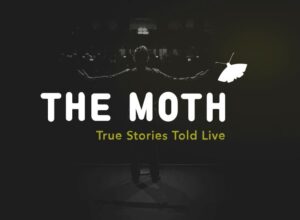 Last night, I went to The Moth – a storytelling competition – hoping to get a chance to speak. The format is to tell a five-minute story that is true, happened to you, and shared without notes.
Last night, I went to The Moth – a storytelling competition – hoping to get a chance to speak. The format is to tell a five-minute story that is true, happened to you, and shared without notes.
The theme was “competition.” I thought I had a doozey: how, in my 20s, I’d found my boyfriend in bed with someone else.
Here’s What Happened
I practiced my story: honing it to a fine sheen. It had great descriptions. And emotion: excitement, shock and deep sadness.
I told myself I just wanted a chance to tell it. What I didn’t admit to was wanting to win.
Then I was picked as the first of the 10 storytellers. I knew it’s statistically impossible to win in this position. The three teams of judges – other members of the audience – always give the first speaker low marks. That’s because they have nothing to compare the talk with until they see other people.
But when I turned out to have the lowest score of the evening, my ego squawked. “I was certainly better than that speaker, or that story!” I muttered in my head.
Then I moved on to beating up on myself. “I teach executives and business professionals how to tell stories. How is it that I did such a poor job?”
Because, the truth was that I had done the best I could in creating and telling this story.
My friend Ellen sincerely agreed that I deserved higher marks. Then she said, “The difference between you and the speakers who scored higher was that they had more energy in their delivery. I guess that’s kind of hard to do with your story.”
Why Am I Telling You this Story?
Here’s what I discovered – once I got back home and consoled myself with some chocolate chip cookies.
How I handle disappointment with myself defines me.
- Be clear about what I want. If I wanted to win, then I probably should have spent more time studying people who already are doing this and learning from them.
- Know the audience. I thought a heartfelt story would differentiate me from other storytellers. Apparently it did: for the wrong reasons. Stories that had some conflict but were lighter, wittier, or had an ending with a twist played better that night.
- Watch what I say to myself. When defending my ego, I descend into blame, judgment and shame. Those can be hard places to get out of.
- Be willing to try again. Neuroscience shows that making mistakes is the best way for the brain to learn. (I sure wish there was a less painful one!) Ellen was right: I need to bring a story with more energy next time.
Next Time
Maybe that’s the most important lesson of all. Make sure I keep taking chances – with more preparation, humility and openness – rather than retreating to a safe place where I feel like an expert.
And it never hurts to have a little chocolate ready for whatever happens!
